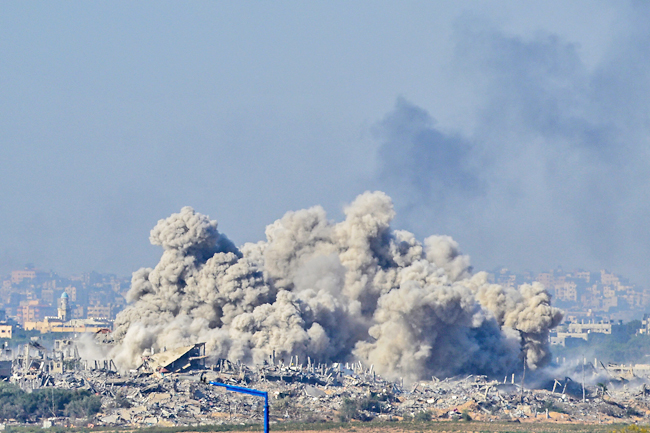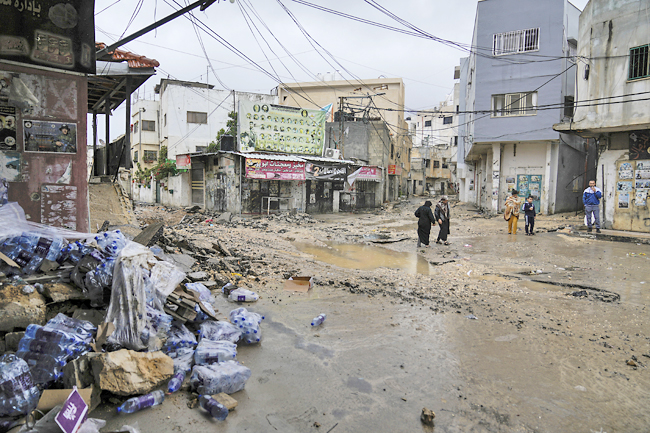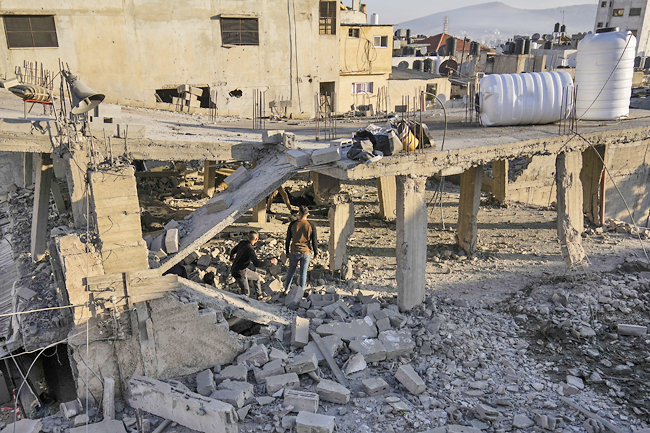QUSRA, WEST BANK (AP) – When Israeli warplanes swooped over the Gaza Strip following Hamas militants’ deadly attack on southern Israel, Palestinians said a different kind of war took hold in the occupied West Bank.
Overnight, the territory was closed off. Towns were raided, curfews imposed, teenagers arrested, detainees beaten, and villages stormed by Jewish vigilantes.
With the world’s attention on Gaza and the humanitarian crisis there, the violence of war has also erupted in the West Bank. Israeli settler attacks have surged at an unprecedented rate, according to the United Nations (UN). The escalation has spread fear, deepened despair, and robbed Palestinians of their livelihoods, their homes and, in some cases, their lives.
“Our lives are hell,” said Sabri Boum, a 52-year-old farmer who fortified his windows with metal grills last week to protect his children from settlers he said threw stun grenades in Qaryout, a northern village. “It’s like I’m in a prison.”
In six weeks, settlers have killed nine Palestinians, said Palestinian health authorities.
They’ve destroyed 3,000-plus olive trees during the crucial harvest season, said Palestinian Authority official Ghassan Daghlas, wiping out what for some were inheritances passed through generations. And they’ve harassed herding communities, forcing over 900 people to abandon 15 hamlets they long called home, the UN said.
Before the war, 2023 already was the deadliest year for Palestinians in the West Bank in over two decades, with 250 Palestinians killed by Israeli fire, most during military operations. Over these six weeks of war, Israeli security forces have killed another 206 Palestinians, the Palestinian Health Ministry said.
Palestinians who’ve endured hardships of Israeli military rule, in its 57th year, said this war has left them more vulnerable than ever. “We’ve become scared of tomorrow,” said Abdelazim Wadi, 50, whose brother and nephew were fatally shot by settlers, according to health authorities.
Conflict has long been part of daily life, but Palestinians said the war has unleashed a new wave of provocations, disrupting even their grim routine.



THE SETTLERS IN FATIGUES
Israel captured the West Bank, east Jerusalem and Gaza in the 1967 Mideast war. Settlers claim the West Bank as their birthright. Most of the international community considers the settlements, home to 700,000 Israelis, illegal.
Palestinians said that in nearly six decades of occupation, Israeli soldiers often failed to protect them from settler attacks or even joined in.
Since the war’s start, the line between settlers and soldiers has blurred further. Israel’s wartime mobilisation of 300,000-plus reservists included the call-up of settlers for duty and put many in charge of policing their own communities.
Rights groups said uniforms and assault rifles have inflated settlers’ sense of impunity.
“Imagine that the military supposed to protect you is now made of settlers committing violence against you,” said Ori Givati, of Breaking the Silence, a whistleblower group of former Israeli soldiers.
THE CURFEW
“Close it!” a soldier barked at Imad Abu Shamsiyya when he met the young man’s eyes through his open window. Then, he pointed his rifle.
Over 52 years, Abu Shamsiyya has witnessed crises strike the heart of Hebron, the only place in which Jewish settlers live amid local residents, not in separate communities.
He thought life in the maze of barbed wire and security cameras couldn’t get worse. Then came the war. “This terror, these pressures,” he said, “are unlike before”.
The Israeli military has barred 750 families in Hebron’s Old City from stepping outside except for one hour in the morning and one in the evening on Sundays, Tuesdays and Thursday, said residents and Israeli human rights organisation B’Tselem. Israeli settlers often roam at night, taunting Palestinians trapped indoors, according to footage published by B’Tselem.
Checkpoints instil dread. Soldiers who in the past just glanced at Abu Shamsiyya’s ID now search his phone and social media. They pat him down, he said, gawking and cursing.
“Hebron is a blatant microcosm of how Israel is exerting control over the Palestinians population,” said Dror Sadot, of B’Tselem.
THE SETTLER RAID
The grinding of a bulldozer’s gears. The crack of a gun. With a glance, parents let each other know the drill: Grab the children, lock the doors, keep away from windows.
Palestinians said settlers storm the northern village of Qusra almost daily, covering olive orchards in cement and dousing cars and homes in gasoline. On October 11, settlers tore through dusty streets, shooting at families in their homes. Within minutes, three Palestinian men were dead.
The next day, settlers heeded social-media calls to ambush a funeral procession the village coordinated with the army. They cut off roads and sprayed bullets at mourners who sprang from cars and sprinted through fields, attendees said.
Ibrahim Wadi, a 62-year-old chemist, and his 26-year-old son Ahmed, a lawyer, were killed. The funeral for four became one for six.
Settlers’ online posts rejoicing at the deaths, shared with The Associated Press (AP), stung Ibrahim’s brother, Abdelazim, almost as much as the loss. “The mind breaks down, it stops comprehending,” he said.
THE OLIVE HARVEST
Palestinians wait all year for the autumn moment that olives turn from green to black. The harvest is a beloved ritual and income boost.
Violence has marred the season. Soldiers and settlers blocked villagers from reaching orchards and used bulldozers to remove gnarled roots of centuries-old trees, they said.
Rights groups said the goal of settler violence is to clear Palestinians from land they claim for a future state, making room for Jewish settlements to expand.
The Bedouin hamlet of Wadi al-Seeq was pushed to its breaking point by three detained Palestinians’ ordeal over nine hours on October 12. Weeks of vigilante violence had already forced 10 families to flee when masked settlers in army uniforms barrelled through that day, slamming a Bedouin resident and two Palestinian activists onto the ground and shoving them into pickups, villagers said.
One of the activists, 46-year-old Mohammed Matar, told AP they were bound, beaten, blindfolded, stripped and burned by cigarettes.
When released, Matar left. So did Wadi al-Seeq’s 30 remaining families. They took their sheep to the creases of the hills east of Ramallah and abandoned everything else.
The Israeli military said it fired the commander in charge and was investigating. Matar said that to move on, he needs Israel to hold someone accountable. “I’d be satisfied with the bare minimum,” he said, “the tiniest shred of justice”. – Isabel Debre






